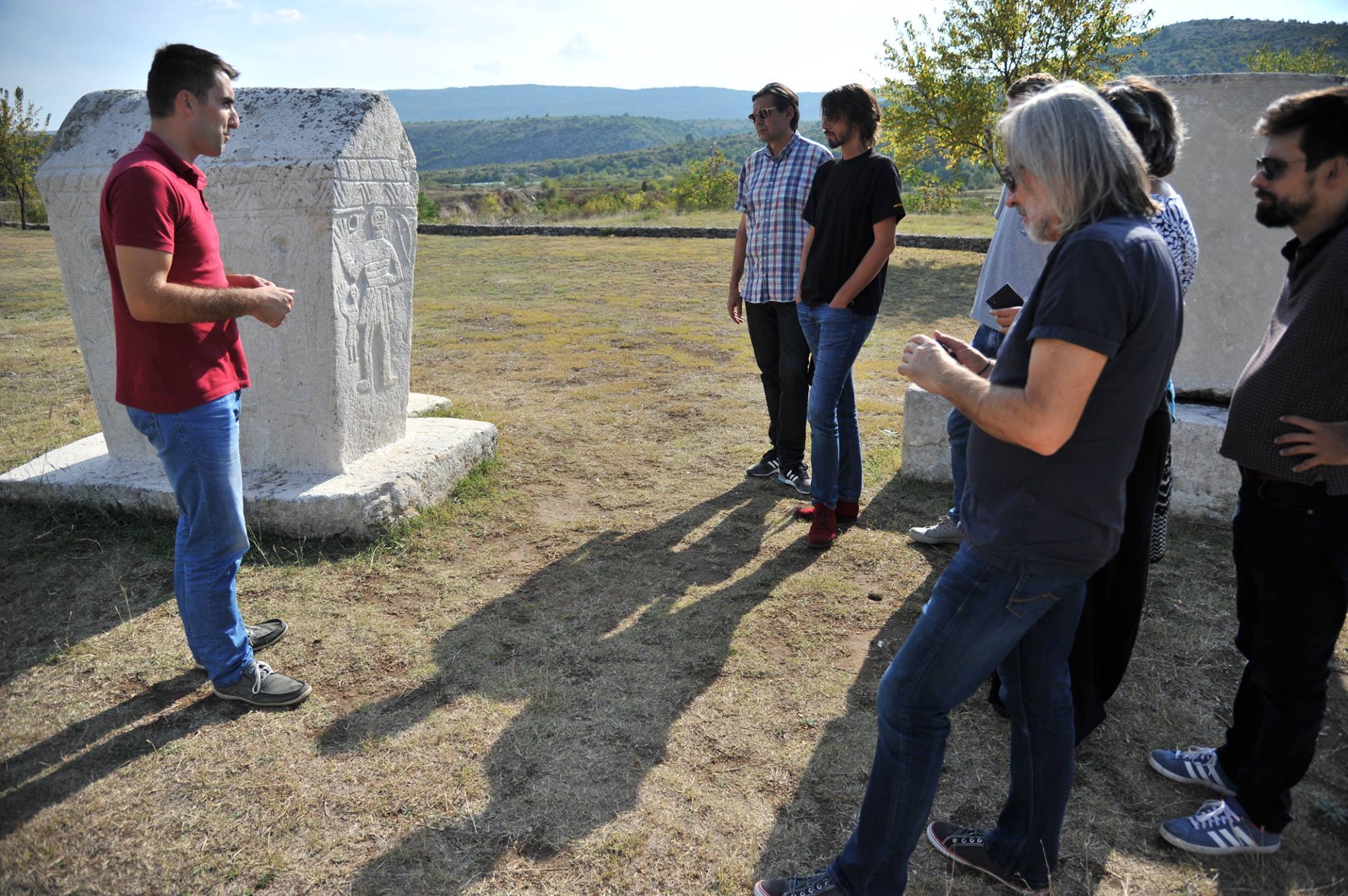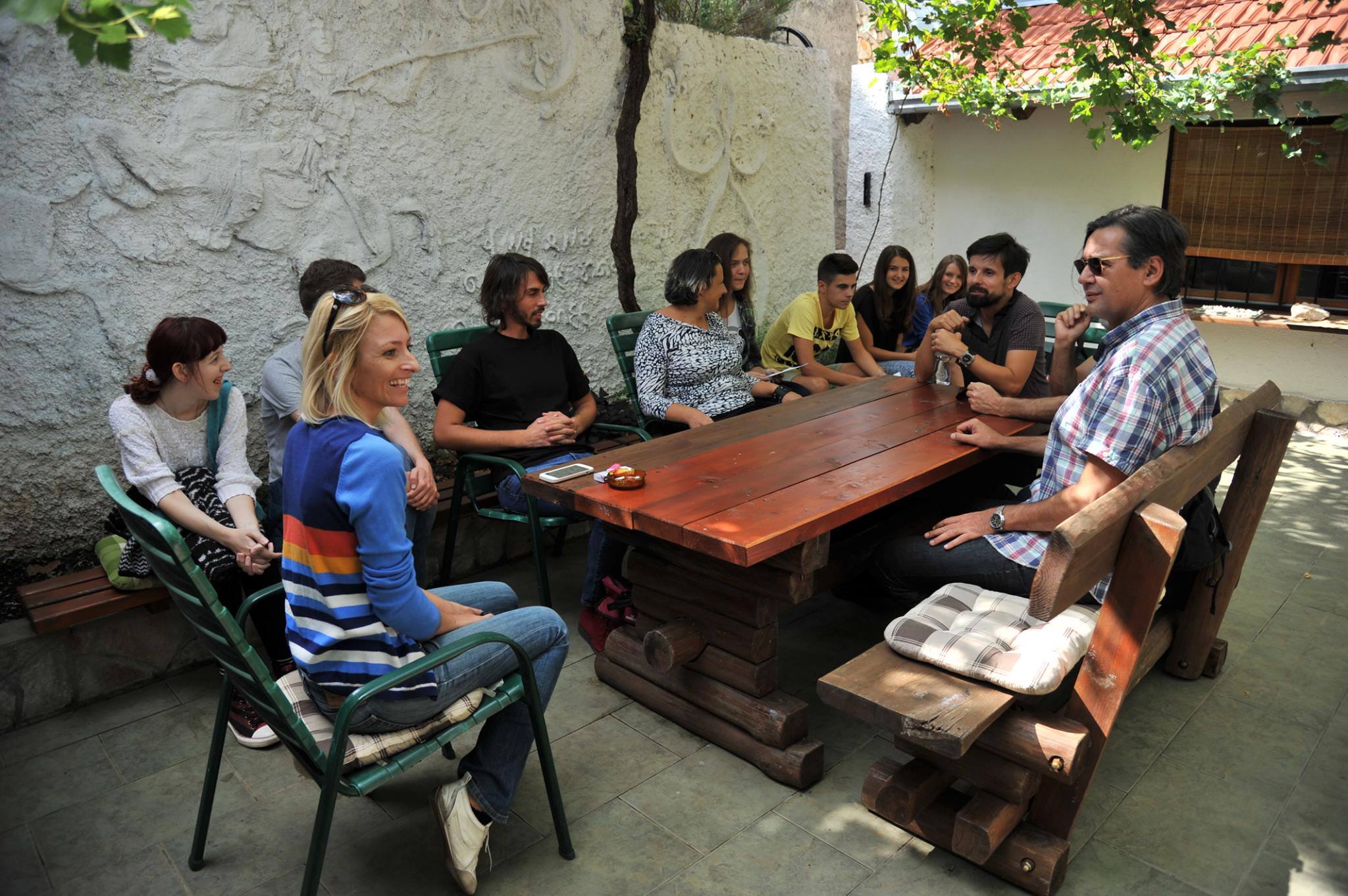The first incarnation of the literary festival Poligon was held in Mostar on September 25-27, 2015 at several different venues in the city. The decentralization of the festival and the “occupation” of Mostar’s cultural hotspots by poets and writers helped revive the city’s dormant literary scene. The festival was imagined as a space for dialogue between authors from the former Yugoslavia, an opportunity for strategic planning and strengthening of interregional literary exchange. In the words of Mirko Božić, the initiator and co-organizer of Poligon, the festival hopes to put Mostar on the region’s literary map by providing a multi-medial platform for literature, but also visual arts and music.
The festival opened with a round table titled Cultural Exchange in the Region: Bridges and Walls, which took place at the United World College, an international school in Mostar. The event’s beginning witnessed a deviation from the pre-established horizon of expectations: when prompted about their own festival experiences in the region, participants and writers Dorta Jagić and Bojan Krivokapić failed to deliver the usual literary lamentations: pointing out that there is no shortage of dialogue and exchange in the area, that they have had nothing but best-possible experiences overall. Loosely moderated, the debate ended with the conclusion that the main obstacles to literary exchange and dialogue are—unfortunately, and predictably—economic in nature.

The debate was followed by a multimedia performance titled Struja svijesti (Stream of Consciousness) with music by Marina Mimoza and Amar Šantić, poetry by Ivana Vezilić, and physical theater by Jasmin Mutić. The performance served as an extended introduction to the reading that featured guests from Zagreb and Belgrade: veterans Branko Čegec and Zvonko Karanović joined a trio of young Mostar poets—Senka Marić-Šarić, who read from her upcoming collection in which she examines the body and illness, the nature of the self and the reality from a feminist perspective; Adnan Žetica, a representative of post-Yugoslav neo-existentialism; and Almin Kaplan, who portrays the aftermath of the war in his dense, heavy poems.
The second festival day began with an excursion to the nearby town of Stolac, birthplace of Mak Dizdar, a towering figure in modern Bosnian-Herzegovinian poetry (I recommend perusing Francis Jones’s English-language translations to anyone who is not familiar with Dizdar’s work). The excursion included a visit to Makova hiža—the Mak Dizdar memorial house—where a group of local high school students treated us to an afternoon of Dizdar’s poems. After that we were given an exciting guided tour of Radimlja—the most famous stećak necropolis still in existence—which included a crash course in reading and interpreting the inscriptions and visual motifs on the ancient tombstones.
This was followed by another panel discussion (this time on literary magazines) in which Branko Čegec, Marko Tomaš, Zvonko Karanović, and Almin Kaplan presented their editorial work, agreeing that despite their disparate editorial experiences, they all share the common thread of financial problems, due to the dearth of cultural policies to help sustain arts organizations and the precariousness of project-based financing models.
The reading that took place afterwards was marked by synergy between diverse generations of authors and different poetic styles and was the high point of the festival. Among the participants were Dorta Jagić, one of the finest Croatian poets; Bojan Krivokapić, a representative of the post-Yugoslav interliterary community known for defecting from one language and identity to another, the eminent Bosnian poet and novelist Faruk Šehić, author of The Book of the Una, Mostar poets Mirko Božić and Marko Tomaš, as well as the new voice of Bosnian-Herzegovinian poetry, Anita Pajević, the winner of this year’s Mak Dizdar unpublished poetic debut prize. The Mak Dizdar prize is the oldest of its kind in the country, intended to stimulate young poets and increase their visibility. Past laureates include regional stars such as Miljenko Jergović and Mile Stojić. This year’s Poligon boasts three prize winners: Krivokapić, Kaplan, and Pajević.
Nicaragua-based, the Mostar poet Mehmed Begić participated vicariously through the Sarajevan electro-duo Basheskia & Edward EQ, who presented their album Savršen metak – pjesme Mehmeda Begića (A Perfect Bullet—the Poems of Mehmed Begić). The following day the festival finished off with a literary matinee at the Pavarotti Music Centre.
Minor organisational shortcomings aside, the first Poligon was a success. The three days packed with events and readings made a fine and welcome excess, but a literary scene can’t subsist on excesses. At the opening round table, Bojan Krivokapić brought up a crucial question: what about the literary life in the city on the 362 days when there are no festival events? As if in response, the organizers decided to set a precedent by launching Poligon Offline, a year-round scheme designed to bring notable poets from the region to Mostar. In the weeks after the festival proper, the program hosted Stanislava Nikolić-Aras and Marko Pogačar. Chances are there will be more dispatches from the south of Bosnia and Herzegovina.
*****
Ivan Šunjić was born in Mostar in 1990. He holds an MA in Croatian language and literature from the University of Mostar and writes criticism and literary theory. His interests include stylistics, semiotics, feminist theory and criticism, contemporary Croatian poetry, post-Yugoslav poetry and prose. In 2014 he won third place in the Mak Dizdar unpublished debut poetry collection contest.
Read more from Croatia:

